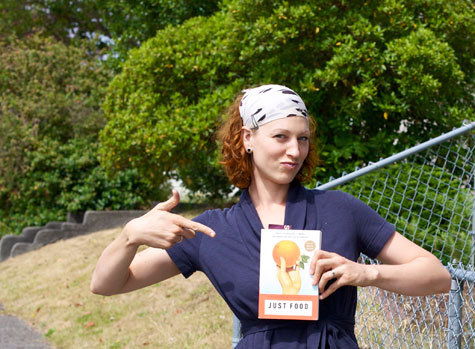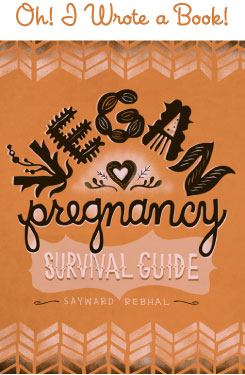
Hello my dears! So, have you finished the book? Ready to get your discussion on? Me too! Picking up right where we left off, let’s jump into some more questions. As always, feel free to use these prompts as starting points, or add your own entirely unique ideas and/or questions at the end. See you in the comments!
1) I’m fairly familiar with the environmental damage done by meat production, but McWilliams did present a few issus in a way that I hadn’t previously considered. Namely, 1) the energetic input required for preparing meat (as opposed to veggies, which are more often only lightly cooked or eaten raw), and 2) the humans (children) impacted by living in close proximity to slaughterhouses (I found this section terribly troubling). Were there any particular parts of this chapter that gave you something new to think about?
2) McWilliams makes a solid case against consuming meat – at least I think he does, but obviously I’m biased. If you eat meat, were you swayed by his report? Do you think the fact that McWilliams is a vegan (he was a vegetarian at the time he wrote Just Food, and only went veg after doing the research for the book) detracts from his credibility on this topic? Or does the fact that he was compelled to go veg actually reinforce his message?
3) It’s interesting to hear McWilliams lay out his case for aquaculture, knowing that he now advocates for a completely plant-based diet. What do you imagine changed?
4) McWilliams writes: “Perverse subsidies are antithetical not only to the responsible production of food but also to the basic principles of market economy, and so are crying out to become not a cause for a nap but a cause du jour.” I think we can all agree on this point, but the question still remains – how? How does one, or one small group, exert enough force to dismantle so much bureaucratic entanglement, as in the case of farm subsidies?
5) According to McWilliams, we live in a global community and should embrace international trade (under “fair trade” standards) in order to maximize efficiency in growing food where food grows best. Do you agree, or do you still hold that eating local is superior? Why or why not?
6) Honestly, the first 5 chapters of Just Food left me overwhelmed and anxious, with no sense of hopeful direction. Thank goodness McWilliams recognizes this, and uses chapter 6, as well as the conclusion, to directly address the many issues that arise when trying to “feed the world – sustainably”. He revisits food miles, organic versus conventional, GM crops, meat consumption, and aquaculture. Did you find his discussion reassuring? Do you think McWilliams went far enough in offering real solutions?
7) Overall, what is your impression of this book. Was it what you had expected? Has it changed the way you think about food? Will it change any of your behaviors around food? What is your “take-away”?
I can’t wait to hear your thoughts. Like last time, I’ll hold off on sharing my own answers until a couple of days have passed. Okay, now have at it!

-
http://bonzaiaphrodite.com/ Sayward Rebhal
-
http://bonzaiaphrodite.com/ Sayward Rebhal
-
http://bonzaiaphrodite.com/ Sayward Rebhal
-
http://bonzaiaphrodite.com/ Sayward Rebhal
-
http://bonzaiaphrodite.com/ Sayward Rebhal
-
http://bonzaiaphrodite.com/ Sayward Rebhal
-
http://bonzaiaphrodite.com/ Sayward Rebhal
-
http://windycityvegan.wordpress.com Monika {windycityvegan}
-
http://windycityvegan.wordpress.com Monika {windycityvegan}
-
http://windycityvegan.wordpress.com Monika {windycityvegan}
-
http://windycityvegan.wordpress.com Monika {windycityvegan}
-
Bliss Doubt
-
Kate
-
Kate
-
Kate
-
Kate
-
Kate
-
Kate
-
Kate
-
http://bonzaiaphrodite.com/ Sayward Rebhal
-
http://bonzaiaphrodite.com/ Sayward Rebhal
-
http://bonzaiaphrodite.com/ Sayward Rebhal
-
http://bonzaiaphrodite.com/ Sayward Rebhal
-
http://windycityvegan.wordpress.com Monika {windycityvegan}
-
http://windycityvegan.wordpress.com Monika {windycityvegan}
-
http://bonzaiaphrodite.com/ Sayward Rebhal
-
http://bonzaiaphrodite.com/ Sayward Rebhal
-
http://bonzaiaphrodite.com/ Sayward Rebhal
-
http://bonzaiaphrodite.com/ Sayward Rebhal
-
http://bonzaiaphrodite.com/ Sayward Rebhal
-
Bliss Doubt
-
Bliss Doubt



